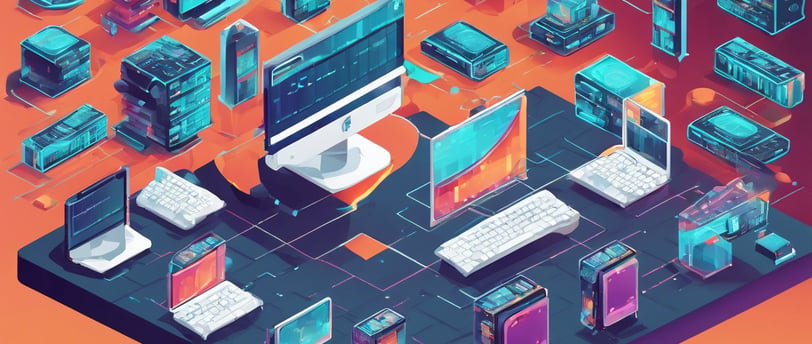The Challenges of Legacy Systems: More Than Just Costs
Legacy systems are often critical to the operations of many organizations, but they present a myriad of challenges that extend beyond mere financial costs. For IT managers and organizations aiming to thrive in today's fast-paced digital landscape, understanding these challenges is essential.
8/19/20243 min read


Legacy systems are often critical to the operations of many organizations, but they present a myriad of challenges that extend beyond mere financial costs. For IT managers and organizations aiming to thrive in today's fast-paced digital landscape, understanding these challenges is essential.
Security Risks
One of the foremost challenges associated with legacy systems is security vulnerabilities. These systems were not designed to withstand modern cyber threats and often lack the necessary updates and patches to protect against attacks. Consequently, they become prime targets for cybercriminals. A prominent example is the Equifax data breach in 2017, which compromised the personal information of 147 million individuals and was directly linked to unpatched legacy systems. Organizations must regularly update and patch these systems or invest in additional security measures to mitigate these risks, as the consequences of a breach can be devastating [3][4].
Inefficient Operations
Legacy systems frequently contribute to inefficient operations. They may not support the current demands of the business, leading to slower processes and decreased productivity. Many organizations report significant productivity losses due to outdated technology. For instance, 48% of UK businesses experience at least three hours of lost productivity daily because of inefficiencies tied to legacy systems, costing around £28,000 annually per employee. Modernizing these systems can streamline operations, enhance overall productivity, and free up resources for more strategic initiatives [2][3].
Increased Maintenance Costs
As legacy systems age, they incur increased maintenance costs. The components needed for repairs become harder to find, and skilled personnel who understand these outdated systems are often in short supply. This situation can create a scenario where organizations spend more to maintain systems that do not effectively support their business needs. In fact, companies may find that the costs associated with maintaining legacy systems can surpass the expenses related to transitioning to newer technologies. For example, the U.S. government reportedly spent over $90 billion in fiscal year 2019 on IT, with about 80% allocated to operating and maintaining legacy systems [2][4].
Integration Challenges
Another significant challenge is the integration issues that arise when trying to connect legacy systems with newer applications. Many legacy systems operate in isolation, making it difficult to share data or communicate with modern software. This lack of integration can lead to data silos, where valuable information is trapped within outdated systems, hindering collaboration and decision-making across the organization. Adopting middleware solutions or APIs can help facilitate better integration, but it often requires additional resources and expertise [1][4].
Compliance Risks
Legacy systems may also pose compliance risks. As regulations evolve, particularly concerning data protection and privacy (e.g., GDPR), organizations using outdated technology may struggle to meet these requirements. Non-compliance can lead to hefty fines and legal repercussions. Regular audits and assessments of legacy systems are essential to identify and address potential compliance issues, ensuring that organizations remain compliant with current laws [3][4].
Talent Drain and Employee Morale
The reliance on legacy systems can lead to a talent drain and negatively impact employee morale. Developers and IT professionals often find maintaining outdated systems tedious and unfulfilling, leading to higher turnover rates. Furthermore, organizations may struggle to attract top talent who prefer to work with modern technologies. This situation can create a cycle where organizations are unable to innovate due to a lack of skilled personnel willing to work with legacy systems [2][3].
The Imperative for Modernization
The challenges posed by legacy systems are multifaceted, affecting security, operational efficiency, compliance, and employee satisfaction. For IT managers, the imperative to modernize these systems is clear. By developing a strategic roadmap for modernization, organizations can address these challenges, reduce risks, and position themselves for future growth and innovation.
While transitioning away from legacy systems may require significant investment, the long-term benefits—enhanced security, improved efficiency, and increased employee morale—far outweigh the costs. Organizations that embrace modernization will not only mitigate the risks associated with legacy systems but also pave the way for sustained success in an increasingly digital world.
If your organization is grappling with the challenges of legacy systems and is ready to modernize, consider reaching out to experts who can guide you through the migration process and help future-proof your operations.
References
1. Bisbal, J., Lawless, D., Wu, B., & Grimson, J. (1999). Legacy Information System Migration: A Brief Review of Problems, Solutions and Research Issues. Trinity College Dublin. [PDF](https://publications.scss.tcd.ie/tech-reports/reports.99/TCD-CS-1999-38.pdf).
2. Klewerton, W. (2020). Perspectives and Challenges to Deal with Legacy Systems. Johannes Kepler University Linz. [PDF](https://wesleyklewerton.github.io/publications/SoftwareModernization.pdf).
3. BairesDev. (2022). 7 Problems with Legacy Systems. [BairesDev Blog](https://www.bairesdev.com/blog/problems-with-legacy-systems/).
4. Applify. (2023). Risks and Challenges of Legacy Systems: Why to Modernize? [LinkedIn Article](https://www.linkedin.com/pulse/risks-challenges-legacy-systems-why-modernize-applify-company).
Transform
Revolutionizing legacy systems for future innovation.
Innovate
Empower
info@cognifai.net
© 2024. All rights reserved.
